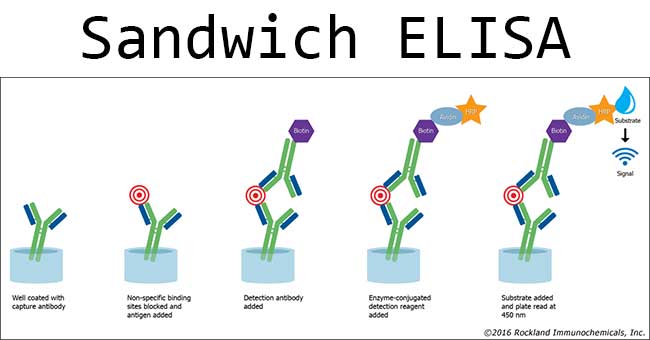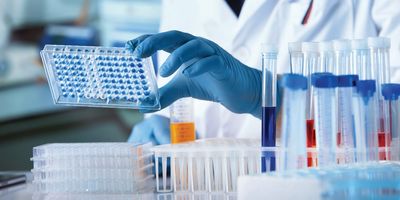ELISA is an abbreviation for “enzyme-linked immunosorbent assay.” In 1974, this test was a substitute for certain radioimmunoassay tests, and eventually, it replaced the western blot test for HIV confirmation.
Thank you for reading this post, don't forget to subscribe!The ELISA test is versatile and medical professionals can perform it easily as compared to other more complicated tests; many variations are available commercially.
What is an ELISA test?
An ELISA test uses components of the immune system (such as IgG or IgM antibodies) and chemicals for the detection of immune responses in the body (for example, infectious microbes). The ELISA test involves an enzyme (a protein that catalyzes a biochemical reaction). It also involves an antibody or antigen (immunologic molecules) that may form an antigen-antibody reaction to provide a positive result or, if they do not react, a negative result.
Examples of the uses of an ELISA test include diagnosing infections such as HIV (human immunodeficiency virus) and some allergic diseases like food allergies and experimental investigations to identify compounds (antigens from a cell lysate in a wide array of organisms).
ELISA tests are also known as immunosorbent assay or an enzyme immunoassay when an enzyme is bound to another substance as an indicator (can cause a color change, for example).
The test is based on a microtiter plate that has a solid phase substrate (target protein, antigen) at a known concentration fixed to the plate that when exposed to an antibody that has an indicator attached (dye for color change or enzyme-labeled antibody) that can produce a color change. Depending on a standard curve for absorption of enzyme-labeled antibody versus antigen level as related to the dye color change, tests may provide semi-quotative, quantitative, and/or identification of many diverse substances. This type of test is termed a direct ELISA.
There are other types of ELISA tests. Indirect ELISA uses a secondary antibody to attach to the substrate, and the sandwich ELISA uses the antibody as the substrate fixed to the microtiter plate.
Uses
ELISA tests primarily detect proteins (as opposed to small molecules and ions such as glucose and potassium). Medical professionals frequently use ELISA tests like blood tests to detect antigens that may be present in the blood.
The substances detected by ELISA tests can include hormones, an allergen, viral antigens (dengue fever, for example), bacterial antigens (TB, for example), and antibodies that the body has made in response to infection (antibodies to hepatitis B, for example) or vaccination. They can also identify an infectious disease agent in patients.
What is an ELISA kit?
An ELISA kit is a commercially available ELISA test that usually contains pre-coated polystyrene plates, detection antibodies, and usually all of the chemicals needed to perform an ELISA test. However, people can purchase special kits with substances designated by the customer.
How does ELISA testing work?
The ELISA test variations, but the most utilized type consists of an antibody attached to a solid surface called “polystyrene plate”. This antibody has an affinity for (will latch on to) the substance of interest, such as a hormone, bacteria, or another antibody. For example, human chorionic gonadotropin hormone (HCG), the commonly measured protein that indicates pregnancy, can be detected by ELISA.
A mixture of purified HCG linked to an enzyme and the test sample (blood or urine) are added to the test system. If no HCG is present in the test sample, only the linked enzyme will bind to the solid surface. The more substance of interest that is present in the test sample, the less linked enzyme will attach to the solid surface. The more the substance of interest is present it will cause a reaction and show up on the test plate in some way, such as a color change of the solution (or like a pregnancy test “two pink lines” or a “+” mark).
Types
There are four types of ELISA tests:
- Direct ELISA: attachment of an antigen to a polystyrene plate followed by an enzyme-labeled antibody that can react with the antigen and a substrate that can be measured.
- Indirect ELISA: attachment of an antigen to a polystyrene plate followed by an unlabeled or primary antibody followed by an enzyme-labeled antibody that can react with both the primary antibody and substrate.
- Sandwich ELISA: A capture antibody is attached to the polystyrene plate, then an antigen is added that specifically attaches or captures the antigen. A second antibody, also specific for the antigen but not the same as the capture antibody is added and “sandwiches” the antigen. This second antibody is then followed by an enzyme-labeled antibody specific for the second antibody that can react with a substrate that can be measured.

- Competitive ELISA: This test is like the sandwich ELISA but involves the addition of competing antibodies or proteins when the second antibody is added. This results in a decrease in the substrate signal generated. This test gives good, highly specific results.
Advantages
ELISA tests are generally good and accurate tests. They are considered highly sensitive and specific (accurate) and compare favorably with other methods used for the detection of substances in the body. The ELISA testing method is more straightforward and easier to perform than older laboratory techniques, which often required radioactive materials.
In general, people do not need to prepare for an ELISA test. Medical professionals perform the test in a lab. If a patient’s blood is required, the only hurt is in blood collection. The risks associated with an ELISA test are rare and associated with blood withdrawal (infection, vessel damage, for example).
What do the results mean?
There are many hundreds of variations of ELISA tests. The results and their meaning depend on what is being tested. For example, an ELISA test for viral RNA can detect it (a positive test), not detect it (a negative test), or be indeterminate (borderline test). Rarely, it may result in a false negative or false-positive result.
For consultation; Feel free to WhatsApp us or visit our clinic.
P. S: This article is only for doctors having good knowledge about Homeopathy and allopathy, for learning purpose(s).
For proper consultation and treatment, please visit our clinic.
Location, address and contact numbers are given below.
NoN of above-mentioned medicine(s) is/are the full/complete treatment, but just hints for treatment; every patient has his/her own constitutional medicine.
To order medicine by courier, please send your details at WhatsApp– +923119884588
 Dr. Sayyad Qaisar Ahmed (MD {Ukraine}, DHMS), Abdominal Surgeries, Oncological surgeries, Gastroenterologist, Specialist Homeopathic Medicines.
Dr. Sayyad Qaisar Ahmed (MD {Ukraine}, DHMS), Abdominal Surgeries, Oncological surgeries, Gastroenterologist, Specialist Homeopathic Medicines.
Senior research officer at Dnepropetrovsk state medical academy Ukraine.
Location: Al-Haytham clinic, Umer Farooq Chowk Risalpur Sadder (0923631023, 03119884588), K.P.K, Pakistan.
Find more about Dr Sayed Qaisar Ahmed at:
https://www.youtube.com/Dr Qaisar Ahmed
